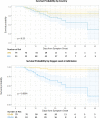Clinical progression and outcomes of patients hospitalized with COVID-19 in humanitarian settings: A prospective cohort study in South Sudan and Eastern Democratic Republic of the Congo
- PMID: 36962562
- PMCID: PMC10021555
- DOI: 10.1371/journal.pgph.0000924
Clinical progression and outcomes of patients hospitalized with COVID-19 in humanitarian settings: A prospective cohort study in South Sudan and Eastern Democratic Republic of the Congo
Abstract
Little information is available on COVID-19 in Africa and virtually none is from humanitarian and more resource-constrained settings. This study characterizes hospitalized patients in the African humanitarian contexts of Juba, South Sudan and North and South Kivu in Eastern Democratic Republic of the Congo. This observational cohort was conducted between December 2020 and June 2021. Patients presenting for care at five facilities or referred from home-based care by mobile medical teams were eligible for enrollment and followed until death or recovery. Disease progression was characterized for hospitalized patients using survival analysis and mixed effects regression model to estimate survival odds for patient characteristics and treatments received. 144 COVID-19 cases enrolled as hospitalized patients were followed to recovery/death. The observed mortality proportion among hospitalized patients was 16.7% (CI: 11.2-23.3%); mortality was three times higher in South Sudan, where patients presented later after symptom onset and in worse conditions. Age and diabetes history were the only patient characteristics associated with decreased survival; clinical status indicators associated with decreased survival included fever, low oxygen level, elevated respiratory and pulse rates. The only therapy associated with survival was non-invasive oxygen; invasive oxygen therapies and other specialized treatments were rarely received. Improving availability of oxygen monitoring and proven COVID-19 therapies in humanitarian and resource-poor settings is critical for health equity. Customizing training to reflect availability of specific medications, therapies and operational constraints is particularly important given the range of challenges faced by providers in these settings.
Copyright: This is an open access article, free of all copyright, and may be freely reproduced, distributed, transmitted, modified, built upon, or otherwise used by anyone for any lawful purpose. The work is made available under the Creative Commons CC0 public domain dedication.
Conflict of interest statement
The authors declare no competing interests.
Figures
Similar articles
-
Operational challenges and considerations for COVID-19 research in humanitarian settings: A qualitative study of a project in Eastern Democratic Republic of the Congo and South Sudan.PLoS One. 2022 Jun 30;17(6):e0267822. doi: 10.1371/journal.pone.0267822. eCollection 2022. PLoS One. 2022. PMID: 35771799 Free PMC article.
-
Risk factors for hospitalisation and death from COVID-19: a prospective cohort study in South Sudan and Eastern Democratic Republic of the Congo.BMJ Open. 2022 May 18;12(5):e060639. doi: 10.1136/bmjopen-2021-060639. BMJ Open. 2022. PMID: 35584876 Free PMC article.
-
Safety and Efficacy of Imatinib for Hospitalized Adults with COVID-19: A structured summary of a study protocol for a randomised controlled trial.Trials. 2020 Oct 28;21(1):897. doi: 10.1186/s13063-020-04819-9. Trials. 2020. PMID: 33115543 Free PMC article.
-
Use of mobile medical teams to fill critical gaps in health service delivery in complex humanitarian settings, 2017-2020: a case study of South Sudan.Pan Afr Med J. 2022 Jun 9;42(Suppl 1):8. doi: 10.11604/pamj.supp.2022.42.1.33865. eCollection 2022. Pan Afr Med J. 2022. PMID: 36158930 Free PMC article. Review.
-
Behavioral and Pharmacotherapy Weight Loss Interventions to Prevent Obesity-Related Morbidity and Mortality in Adults: An Updated Systematic Review for the U.S. Preventive Services Task Force [Internet].Rockville (MD): Agency for Healthcare Research and Quality (US); 2018 Sep. Report No.: 18-05239-EF-1. Rockville (MD): Agency for Healthcare Research and Quality (US); 2018 Sep. Report No.: 18-05239-EF-1. PMID: 30354042 Free Books & Documents. Review.
Cited by
-
Operational challenges and considerations for COVID-19 research in humanitarian settings: A qualitative study of a project in Eastern Democratic Republic of the Congo and South Sudan.PLoS One. 2022 Jun 30;17(6):e0267822. doi: 10.1371/journal.pone.0267822. eCollection 2022. PLoS One. 2022. PMID: 35771799 Free PMC article.
-
Risk factors for hospitalisation and death from COVID-19: a prospective cohort study in South Sudan and Eastern Democratic Republic of the Congo.BMJ Open. 2022 May 18;12(5):e060639. doi: 10.1136/bmjopen-2021-060639. BMJ Open. 2022. PMID: 35584876 Free PMC article.
References
-
- World Health Organization (WHO). COVID-19 Dashboard. URL: https://covid19.who.int/. Accessed Sep 21, 2021.
-
- World Health Organization (WHO). The Global Health Observatory Data Repository. Population Estimates by WHO Region. URL: https://apps.who.int/gho/data/view.main.POP2020. Accessed Aug 21, 2021.
-
- Katchunga PB, Murhula A, Akilimali P, Zaluka JC, Karhikalembu R, Makombo M, et al.. Seroprevalence of anti-SARS-CoV-2 antibodies among travelers and workers screened at the Saint Luc clinic in Bukavu, eastern Democratic Republic of the Congo, from May to August 2020. Pan African Medical Journal. 2021;38:93. doi: 10.11604/pamj.2021.38.93.26663 - DOI - PMC - PubMed
-
- The World Bank. Open Data on physicians and hospital beds by country. Available at https://data.worldbank.org/indicator/SH.MED.PHYS.ZS and https://data.worldbank.org/indicator/ SH.MED.BEDS.ZS. Accessed Aug 22, 2021.
Grants and funding
LinkOut - more resources
Full Text Sources


